Aged care assessments
The use of aged care services by a person with dementia will depend on numerous factors, including their health status and presence of other health conditions, the types of activities for which assistance is required and level of assistance needed, current carer status and availability, financial resources, accessibility, cultural influences and personal preferences.
Access to government-subsidised aged care services is co-ordinated through the My Aged Care system. After an initial screening to establish the person’s needs and types of services that could help, an appointment is organised with an assessor who will undertake an assessment. Data from the National Screening and Assessment Form (NSAF) captures information from both the initial screening and assessments.
There are two main types of assessment services depending on the level of care needed:
- Home Support Assessments – face-to-face assessments provided by Regional Assessment Services for people seeking community-based entry-level support that is provided under the Commonwealth Home Support Programme
- Comprehensive Assessments – provided by Aged Care Assessment Teams for people with complex and multiple care needs to determine the most suitable type of care (home care, residential or transition care). By law, a Comprehensive Assessment is required before someone can receive residential, home, or transition care.
As part of a home support assessment or a comprehensive assessment, an assessor must record ‘at least one health condition (including mental health conditions or disabilities) which impact the person’s need for assistance with activities of daily living and social participation’ (Department of Health 2018). Therefore, people with dementia can be identified using assessment data where dementia is recorded as a health condition impacting their care needs. Dementia may already be diagnosed or Aged Care Assessment Teams may refer a person to be diagnosed for the first time during an assessment. See How is dementia diagnosed? for information on how people with dementia are diagnosed.
This page provides information on people with dementia who completed a comprehensive and/or home support assessment in 2021–22.
Around 37,100 people with dementia completed an aged care assessment in 2021–22
In 2021–22, just over 37,100 Australians who completed an aged care assessment (either a comprehensive or home support assessment) had dementia recorded as a health condition (Figure 10.1). This equates to 9.3% of people who completed an aged care assessment that year.
Among people with dementia who completed an aged care assessment, just over half were women (53% or 19,700 women, and 17,500 men).
Figure 10.1: People with dementia who completed an aged care assessment in 2021–22, by age and sex
Figure 10.1 is a bar graph showing the number of people with dementia who completed an aged care assessment in 2021–22, by age group and sex. Women and men in the 75–84 year age group accounted for the largest number of assessments (9,251 and 8,527 respectively), followed by women (6,766) and men (5,623) aged 85–94.
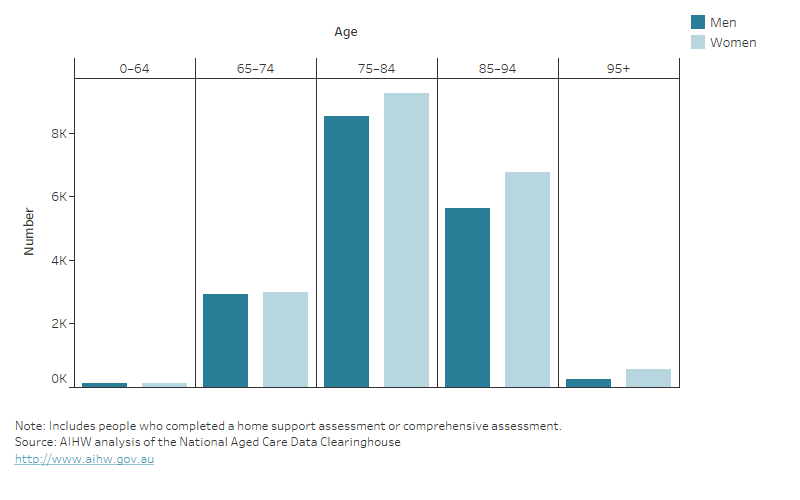
People with dementia were more likely to be seeking (or were more likely to be directed to seek) a higher level of aged care. Just over 4 in 5 (81%) aged care assessments undertaken by people with dementia in 2021–22 were comprehensive assessments (for people with more complex care needs) compared with 43% of people without dementia.
Almost half (47%) of people with dementia who completed a comprehensive assessment and 53% of people who completed a home support assessment were aged 75–84. People with dementia who completed a comprehensive assessment tended to be older (38% were aged 85 or over) than those who completed a home support assessment (24%) (Figure 10.2).
Among those who had a comprehensive assessment, just over 4 in 5 people with dementia had their dementia reported as the main condition impacting their need for assistance (82%) (Table S10.2).
Figure 10.2: People with dementia who completed an aged care assessment in 2021–22: percentage by age and assessment type
Figure 10.2 is a bar graph showing the percentage of people with dementia who completed an aged care assessment in 2021–22, by age group and assessment type. Around half of people who completed a home support assessment were aged 75–84, about 1 in 5 were aged 65–74 and another quarter were aged 84–94. People who completed a comprehensive assessment were more likely to be older: nearly half were aged 75–84 and just over one third were aged 84–94.
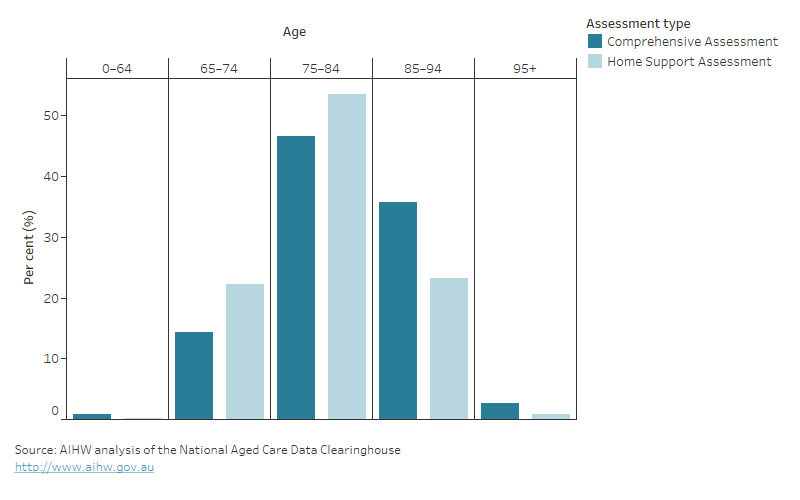
An additional 19,300 people with cognitive impairment (but no record of dementia) completed an aged care assessment
This equates to 4.9% of people who completed an aged care assessment in 2021–22 (Table S10.3).
This group includes people with mild cognitive impairment – where they have significant memory loss but no other changes in cognitive function. Mild cognitive impairment increases the risk of Alzheimer’s disease, but it does not mean that the development of dementia is certain. However, it is recognised that some people with cognitive impairment who complete an aged care assessment may be in the early stages of dementia and are yet to receive a formal diagnosis. Therefore, the number of people with dementia in this report may be an underestimate of the true number of Australians with dementia seeking entry into aged care services.
Women with dementia were more likely to be living alone at the time of their assessment than men with dementia
The majority (97%) of people with dementia who completed an aged care assessment in 2021–22 (both for comprehensive and home support assessments) were living in the community at the time of their assessment.
The living arrangements of people with dementia differed substantially by sex among those who completed home support assessments and comprehensive assessments (Figure 10.3). Men with dementia were more likely to be living with their partner than women with dementia—74% of men who completed a home support assessment compared with 48% of women, and 63% of men who completed a comprehensive assessment compared with 35% of women.
In contrast, women with dementia were much more likely to be living alone than men with dementia—11% of men who completed a home support assessment compared with 28% of women, and 21% of men who completed a comprehensive assessment compared with 40% of women. Women with dementia were also more likely to be living with family than men with dementia—12% of men who completed a home support assessment compared with 20% of women, and 14% of men who completed a comprehensive assessment compared with 23% of women.
Patterns in living arrangements for people with dementia were largely also reflected among those without dementia, likely due to women living longer on average.
Figure 10.3: Living arrangements of people who completed an aged care assessment in 2021–22: percent by dementia status, sex and assessment type
Figure 10.3 is a bar graph showing the living arrangements of people who completed an aged care assessment in 2021–22. The graph is disaggregated by assessment type (home support or comprehensive) and sex, and shows percentages for people with and without dementia. For people with dementia, the patterns were similar for both assessment types. At the time of their assessment, men were more likely to live with their partner than women and women were more likely than men to live alone or live with family.
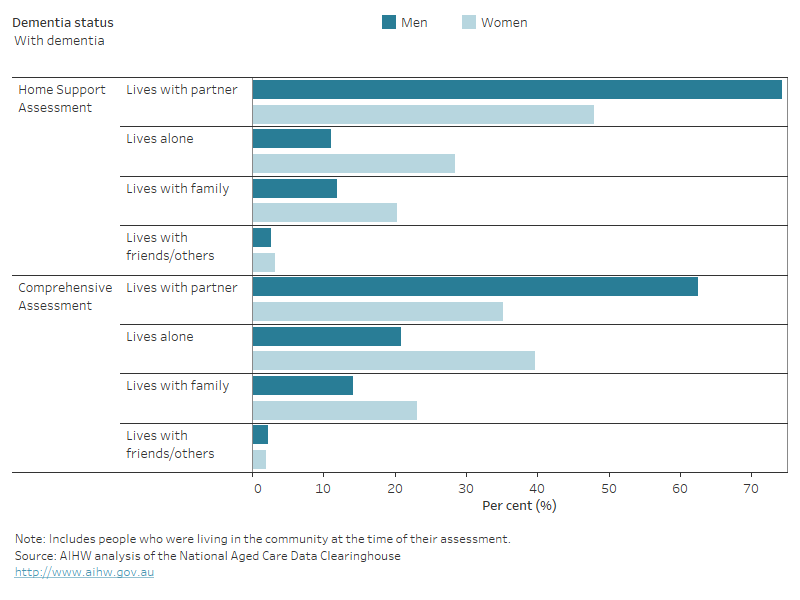
The majority of people who completed a home support assessment (90% of people with dementia and 91% of people without dementia) and 3 in 5 people who completed a comprehensive assessment (61% of people with dementia and 65% without dementia) in 2021–22 completed the assessment in their own home. Comprehensive assessments can also take place in a hospital, and 25% of people with dementia had their comprehensive assessment performed in a hospital setting. This was similar to people without dementia who completed a comprehensive assessment that year (24%) (Table S10.5).
The majority of people with dementia (91%) were receiving assistance from a carer who was not associated with a service provider or paid service – this was much higher than for people without dementia (52%) (Table S10.6). Refer to Carers of people with dementia for detailed information on informal carers of people with dementia.
Triggers for doing an assessment
There are a number of triggers that indicate a potential need for aged care services and so prompt an aged care assessment to take place. These may be closely related to the individual’s health and care needs, or related to other circumstances such as a change in care arrangements.
In 2021–22, 94% of people with dementia who completed a comprehensive assessment and 59% who completed a home support assessment had more than one trigger for needing an assessment. This was higher than for people without dementia; 91% who completed a comprehensive assessment and 41% who completed a home support assessment (Table S10.7).
When looking at individual triggers, aged care assessments for people with dementia were most commonly triggered by:
- Change in cognitive status – 83% who completed a comprehensive assessment and 50% who completed a home support
- Change in care needs – 78% who completed a comprehensive assessment and 36% who completed a home support assessment
- Medical condition – 73% who completed a comprehensive assessment and 62% who completed a home support assessment
- Frailty – 54% who completed a comprehensive assessment and 26% who completed a home support assessment (Figure 10.4).
Understandably, aged care assessments for people with dementia were much more likely to be triggered by a change in cognitive status than for those without dementia (where a change in cognitive status triggered 21% of comprehensive assessments and 2.3% of home support assessments). Aged care assessments for people with dementia were also slightly more likely to be triggered by changes in care needs, care arrangements, mental health and risk of vulnerability than for people without dementia for both assessment types.
Figure 10.4: Triggers for aged care assessments among people who completed an aged care assessment in 2021–22: percent by dementia status and assessment type
Figure 10.4 is a bar graph showing the triggers for aged care assessments (home support or comprehensive assessments) among people who completed an aged care assessment in 2021–22. The graph depicts the proportion of assessments accounted for by each trigger for both people with and without dementia. An assessment could have more than one trigger recorded. Just over 2 in 5 people with dementia who had a comprehensive assessment were triggered to have the assessment by a change in their cognitive status. Other common comprehensive assessment triggers for people with dementia were a change in care needs, medical condition and frailty. The most common triggers for people with dementia to get a home support assessment were medical condition (almost 2 in 3 people) and a change in cognitive status (50%). The most common trigger for both types of assessment for people without dementia was a medical condition.
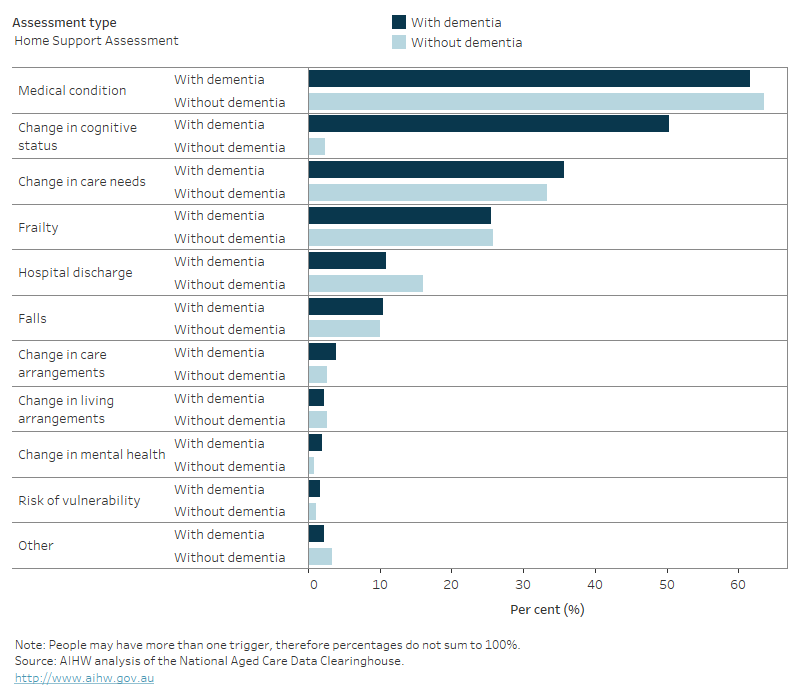
Co-existing health conditions
Older people who require support and assistance provided by aged care services often have a number of co-existing health conditions. On average, people with dementia had 6.1 health conditions (including dementia) listed on their aged care assessment. This was similar to the average for people without dementia (5.5 health conditions). However, people with dementia who had a comprehensive assessment had more conditions recorded on average (6.5 health conditions) than those who had a home support assessment (4.6 health conditions) (Table S10.9). This reflects the fact that comprehensive assessments are generally undertaken for people with more complex care needs, who also tend to be older.
Figure 10.5 shows the 10 most common health conditions for people with dementia who completed an aged care assessment in 2021–22, and how this compared to people without dementia.
The most common conditions among people with dementia who completed an aged care assessment were:
- high blood pressure (49% of all people with dementia)
- osteoarthritis (29%)
- high cholesterol (27%).
The 10 most common conditions for those with dementia were also frequently reported by people without dementia. The three most common conditions listed above, were recorded more frequently for those without dementia (52%, 35% and 28% respectively).
A number of cardiovascular conditions, such as heart disease and atrial fibrillation were among the 10 most common conditions recorded for men with dementia but not for women with dementia. In contrast, osteoporosis, anxiety, and thyroid-related disorders were reported among the leading 10 conditions for women but not men with dementia. Similar differences by sex were also observed among people without dementia.
Figure 10.5: Leading 10 health conditions impacting care needs of people who completed an aged care assessment in 2021–22: percent by dementia status and sex
Figure 10.5 is a bar graph showing the 10 most common health conditions impacting the care needs of people who completed an aged care assessment in 2021–22: the percentage for people with and without dementia by sex. Hypertension (high blood pressure) was the most common condition, affecting around half of men and women, both with and without dementia. Other common conditions were osteoarthritis and high cholesterol.
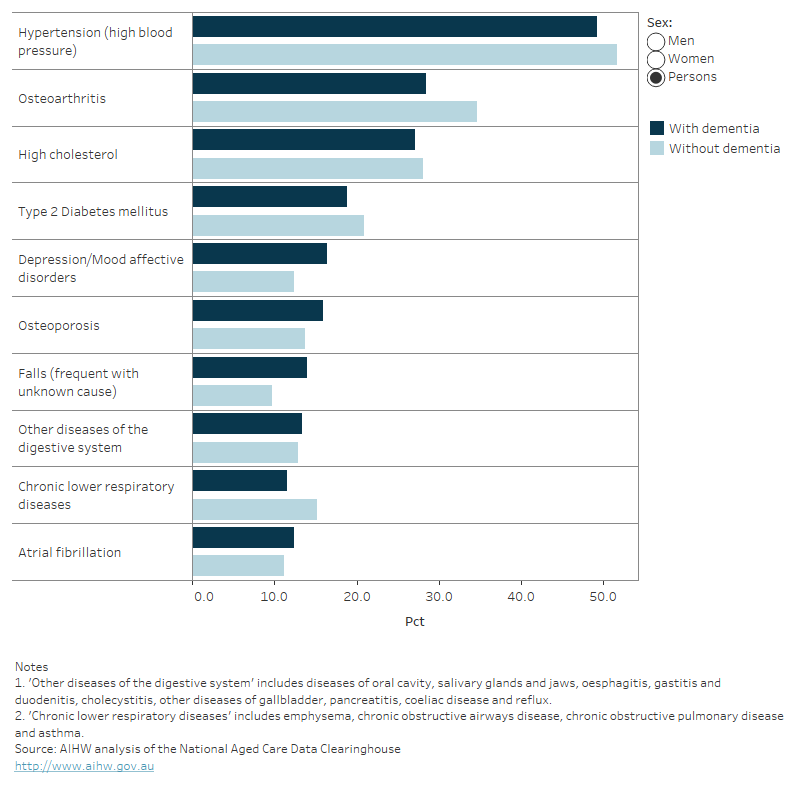
The most common conditions shown in Figure 10.5 are similar to those reported by people with dementia in the ABS Survey of Disability, Ageing and Carers (SDAC) 2018. However, aged care assessment data and the SDAC capture different populations; in particular, the SDAC provides useful comparisons between people with dementia living in the community and those in cared accommodation (such as residential aged care), even if they did not undertake an aged care assessment. See How do care needs of people with dementia differ by place of residence? for more information on findings from the SDAC.
Geographic variations
To assess variation in aged care assessments completed for people with dementia by state and territory, age-standardised rates were calculated for people aged 65 and over by the type of assessment they received. Age-standardised rates are used to account for population differences due to age. Crude rates for states and territories are available in Table S10.11.
The rate of older Australians (those aged 65 and over) who had dementia and completed an aged care assessment in 2021–22 varied by state and territory (Figure 10.6). For home support assessments, age-standardised rates were highest in the Australian Capital Territory (2.1 per 1,000 people) and lowest in the Northern Territory (0.8 per 1,000 people). For comprehensive assessments, rates were highest in Queensland (7.6 per 1,000 people) and lowest in Tasmania (5.1 per 1,000 people).
These variations may reflect differences in both the demand and utility of aged care services, as well as availability of other care and support for people with dementia across state and territories.
Figure 10.6: People with dementia who completed an aged care assessment in 2021–22: age-standardised rate by assessment type and state/ territory
Figure 10.6 is a bar graph showing age-standardised rates of people with dementia who completed an aged care assessment in 2021–22, by state or territory of residence. For every 1,000 people aged 65 and over living in Australia, 1.6 people with dementia completed a home support assessment. Home support assessment rates were highest in the ACT and lowest in the Northern Territory. For every 1,000 people aged 65 and over living in Australia, 6.8 people with dementia completed a comprehensive assessment. Comprehensive assessment rates were highest in Queensland and lowest in Tasmania.
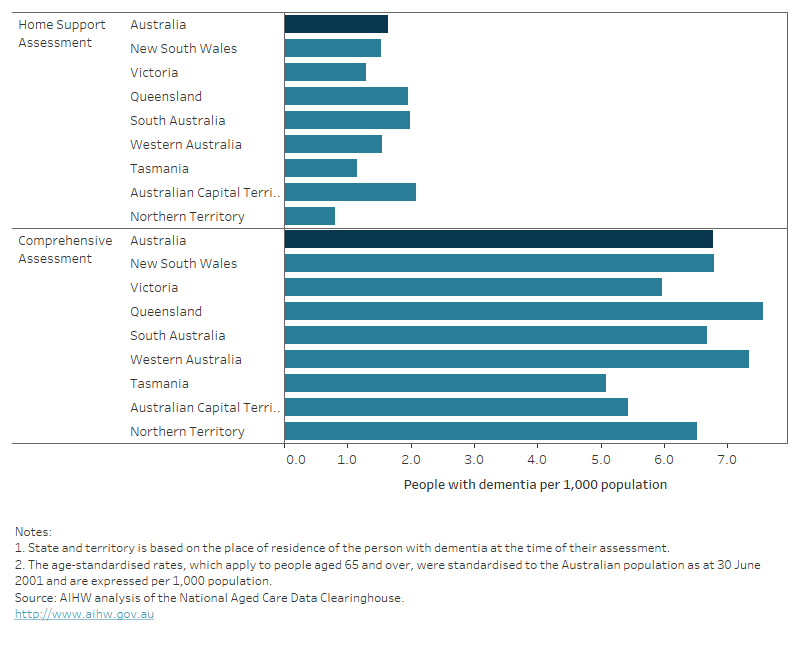
Approvals for use of aged care services
Assessors recommend and approve people for entry into a range of aged care services based on a person’s long-term care needs. Approvals are not only provided for immediate use of services but also for future use if a person’s care needs are likely to change. This means that people can be approved for multiple services.
In 2021–22, the majority of people with dementia who completed a comprehensive assessment were approved for:
- residential respite care (72% of people with dementia who completed a comprehensive assessment, or 21,600 people)
- permanent residential aged care (66% or 19,900 people)
- community-based care under the Home Care Packages Program (63% or 19,000 people).
This highlights the current and anticipated need for a range of aged care services, particularly as a person’s dementia progresses.
Information on the aged care service approvals for people with dementia who completed a home support assessment was not available in the NSAF data.
Department of Health and Aged Care (2023) NSAF User Guide, Department of Health and Aged Care, Australian Government, accessed 15 June 2023.


